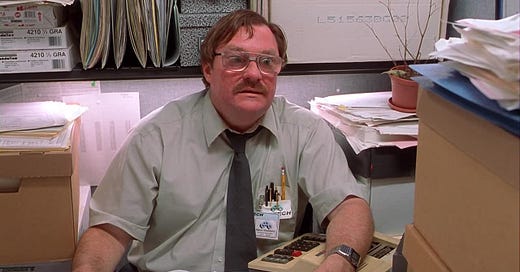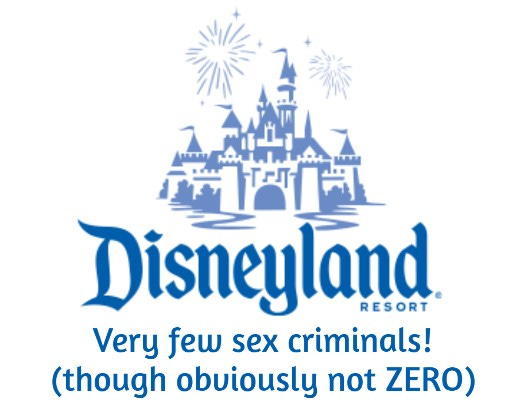This week, Vanity Fair entered a 8,700 word tome into the esteemed genre of “toxic workplace” journalism. The article describes alleged bad behavior at the hit ABC drama Lost, including general assholery and the marginalization of nonwhite staff. It’s the maddest people have been at Lost since they realized that the writers had no fucking idea what the smoke monster was and were just going to pull something out of their asses at the last minute.
“Toxic workplace" journalism has become it’s own genre in the last few years. You may recall articles about alleged toxic workplaces at Amazon, Apple, Uber, Facebook, Google, Twitter (pre-Elon), Twitter (post-Elon), Wells Fargo, The Ellen DeGeneres Show, The Kelly Clarkson Show, The Dr. Phil Show, Vice, Nike, Women’s Professional Soccer, The Dallas Mavericks, and every single video game company. It’s a type of article that’s ensconced itself in the media landscape, much like “analysis” that rides the coattails of a popular TV show or breathless coverage of the whereabouts of Pete Davidson’s penis.
Toxic workplace articles vary greatly in quality. The good ones include serious claims from multiple on-the-record sources, and those claims are corroborated where possible. The article attempts to provide context for the claims and describe the scale of the problem. People with different perspectives — including the accused — are given a chance to speak, and their words are presented without comment.
As for the bad articles…yeah, they don’t bother with any of that crap. Small numbers of off-the-record sources are given free rein to shit-talk to kingdom come. Context and scale are entirely absent, and minor faux-pas are treated as crimes against humanity. Different perspectives are absent, or — when included — essentially function as an alley-oop so that the author can respond with a rim-rattling thunder dunk of a retort.
I question the usefulness of this genre. I suppose there’s value to having truly egregious cases of misconduct publicly called out, but even then, “publicly called out” is different from “litigated”. “Litigated” implies some level of due process, i.e. a back-and-forth, and a diligent uncovering and evaluation of all relevant facts. Many of these articles simply share horror stories from a few employees, label the workplace “TOXIC”, and then call it a day. Readers don’t have nearly enough information to develop an informed opinion about what the environment really was like or what should be done in response.
What does “toxic” even mean? It’s entirely in the eye of the beholder. It could mean anything from “whipped me with a cat o’ nine tails for taking a bathroom break” to “was slow to re-stock the K-cups in the kitchen.” A 2018 survey found that 52 percent of tech workers consider their workplace “toxic”. So, “toxic” is literally the norm. Interestingly, the three companies found to be the least toxic in that survey were Uber, Google, and LinkedIn, which are, respectively: 1) The company that was the subject of an exposé so damning that it led to a federal investigation; 2) The focus of a 2018 New York Times feature about sexual misconduct; and 3) The company frequently excoriated for epitomizing “hustle culture”. So many people consider their workplace to be “toxic” that an “Employees Expose TOXIC WORKING CONDITIONS” article could be written about any company larger than an independently owned coffee shop, and sometimes those companies get called toxic, too.
Office dynamics are uncomfortable by nature. There’s a hierarchy: Other adults can tell you what to do. If you don’t do what they say, you’ll be fired, and then you won’t be able to get your drink on provide food for your children. You have to interact with a bunch of coworkers whom you didn’t choose, and because they’re people, many of them suck. It’s inevitable that nerves will get frayed, fights will happen, and people will do things that they shouldn’t. That’s why every company has a Human Resources department that basically plays the role that the principal’s office played in school: The threat of being sent to that dour little office to receive a stern lecture is enough to keep most people in line.
Sometimes, intra-office squabbles make it into toxic workplace articles. Consider this tidbit from the Vanity Fair article about Lost:
An editor once made a minor suggestion regarding a story, and according to a Lost employee I’ll call Seamus, Lindelof [Lost’s showrunner] made it clear her job would be in danger if she ever did it again. “She wrote an almost offensively effusive mea culpa letter—‘I’m so sorry,’ ” Seamus said. Offering storytelling input to Lindelof, Seamus observed, was “an absolute no-fly zone.”
Okay…what’s the problem here? An editor gave the showrunner story notes — yeah, that could get you in trouble, possibly even fired (though the editor wasn’t fired). Context matters a lot; did the editor merely offer a thought about the story during an editing session? That could be no big deal or even welcome, probably not something that should get you in trouble. But did the editor, like, send an e-mail saying “what if Jack turned out to be a robot?” That could and perhaps should get you canned (one more time: It didn’t). Some people who work on TV shows try to write the show even though they’re not writers; it's a constant problem. If Lindelof had instituted a “come one, come all, no limits” policy on story notes, then soon, the animal wrangler would have been pitching a love triangle between Kate, Robo-Jack, and the Smoke Monster. Whether Lindelof or the editor was out of line is impossible to know without context that — of course — the article doesn’t provide.
An organization of any size will have assholes, and even some outright criminals. This fact recently became relevant when Ron DeSantis’ allies sought to gain leverage in the Florida governor’s spat with Disney by highlighting the fact that four Disney employees were arrested for sex crimes against minors in a 2022 sting. The nominal claim was true: Four Disney employees were among the 108 people arrested by the Polk County Sheriff’s Office. But if a police sting just outside of Orlando turns up a few people who work for the largest employer in Central Florida, then what’s been demonstrated? I’d say “nothing”. Of course, no company — and probably especially not Disney — wants to say “Hey, we’re a big company, there are just going to be a few sex criminals. Deal with it.” So instead, they always say “we take this seriously and will do better.” But there will always be some reprobates, and busting a few bad guys doesn’t necessarily tell us anything about the corporate culture.
None of this is to say that there should never be articles about toxic workplaces. The press has a role in exposing bad behavior. Companies shouldn’t be able to behave badly and then behave badly again by covering up their bad behavior, Theranos-style. But I think it's critical that “toxic workplace” articles have the traits I outlined in the third paragraph, which is to say: They should be well-vetted accounts of serious misconduct, verified where possible.
But a lot of these articles are just shit talk. They’re one-sided accounts from employees with an axe to grind, credulously published by hack columnists desperate for a byline. Which doesn’t even mean that there wasn’t misbehavior! Maybe there was. But we can’t know, because the article doesn’t do the things it would need to do to convince fair-minded people that something beyond a run-of-the mill intra-office pissing match occurred.
People lie. They forget things, or remember them wrong. They retell stories in ways that skew key details or omit them entirely. Accounts need to be vetted, scrutinized, and analyzed…always. Did you know that Tara Reade — who accused Joe Biden of sexual assault — just moved to Russia and applied for citizenship? She was on Russian state TV on Tuesday, sitting next to convicted spy Maria Butina and informing us that “this illusion of Russia as an enemy is propagated by a few Washington elites who are determined to cause problems.” Call me a conspiracy theorist, but I think that maybe she has an agenda. And I think that the media outlets who credulously published her claims with little to no scrutiny have some explaining to do.
I understand the appeal of a big, splashy feature with a ominous-looking graphic and a headline that yells “SCANDAL!!!” It has the imprimatur of Big Serious Journalism By Important Journalists Who Deserve A Raise And Maybe Their Own Podcast Like Kara Swisher, Please? But in my opinion, toxic workplace articles usually fail to deliver the goods. They’re often nothing more than unverifiable complaints from pissed off employees. And you can always track down a few pissed off employees, because workplaces produce angry people like The Little Mermaid produces fish fetishes. Journalists should find something else to write about. Such as: What’s Pete Davidson’s penis been up to lately? Now that’s a story.






I think this whole “my workplace must be racist because Jenny was mean to me once”
Is a sign of progress. This is what’s left. Petty uninteresting disputes raised to the level of heresy because there isn’t enough heresy left to fulfill people’s rage boners. So they go looking for the tiniest blemish.
I’ve often said. Modern society is like a sheet that is bleach white and perfectly clean. (Which it is compared to, you know, all of history). When a sheet is that clean every tiny speck will stand out. This is people freaking out over tiny specks.
This may explain why we haven't heard from Paula Fox, Assistant to the Executive Producer, lately